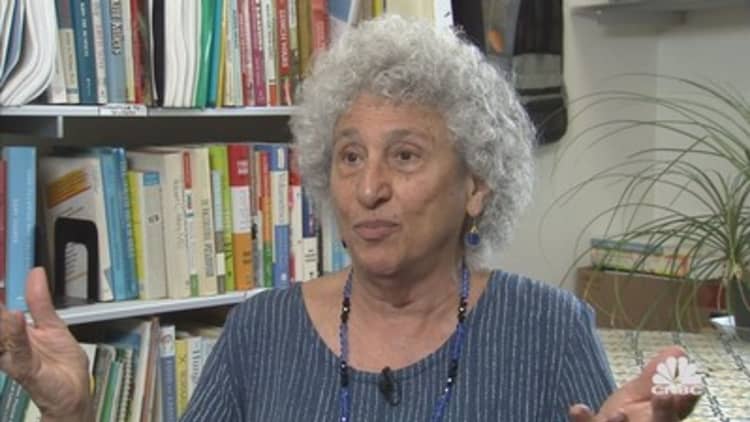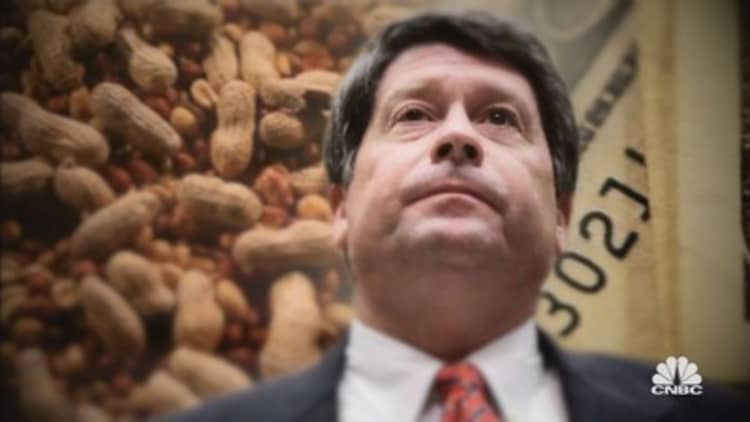Measures to protect food safety could be on the chopping block under President Donald Trump's proposed federal budget, which would slash appropriations for the Food and Drug Administration (FDA). The White House proposes to make up those budget cuts — and then some —through fees paid by the industry. But with intense opposition from business, congressional leaders have been unwilling to consider the fees, leaving that part of the proposal unlikely to pass.
"I think the FDA needs far more resources if it's going to do its job well," said Marion Nestle, an author and professor of nutrition, food studies and public health at New York University.
The agency does have new regulatory tools, some of which just took effect in May, under the Food Safety Modernization Act (FSMA), signed into law by President Barack Obama in 2011. That law followed one of the deadliest outbreaks of foodborne illness in U.S. history, in a case profiled in the latest episode of CNBC's "American Greed."
Peanut Corporation of America President Stewart Parnell became the first food company CEO in U.S. history sent to prison for selling tainted food, after a federal jury in Albany, Georgia, found he knowingly ordered workers to ship contaminated peanut products to customers nationwide. As many as 20,000 people were sickened; nine died. Parnell, now 63, is serving a 20-year prison sentence following his conviction on 71 felony counts. He is appealing his conviction and sentence.
Darin Detwiler, director of the masters program in food regulation at Northeastern University in Boston, said conditions at the PCA plant were appalling.
"There was rat infestations. There was bird droppings. They found holes in the roof, and water would gather and bird droppings would get into the water that would seep into this product. And sometimes he literally had employees sweep off some of the rat poop," Detwiler told "American Greed." "This was just business as usual."
The new law mandates more inspections to prevent situations like that in the future, and FDA Commissioner Scott Gottlieb said during his confirmation hearing in the spring that he is committed to upholding the law.
"I think FSMA was a significant advance in terms of giving the agency the authority it needed and the resources it needed to ensure the food supply is safe," he said on April 5. "My mandate is to make sure FSMA is implemented in a proper way, and that we're striking the right balance with respect to that implementation."
That "balance" has some food safety advocates concerned.
"The Trump administration came in with an explicit vow that they were going to undo what the (Obama) administration had done, and that includes food safety," Nestle said.
Indeed, the Trump budget, without being specific, calls for regulatory reform at the FDA and other agencies.

"Everyone believes in and supports safe food supplies and clean air and water. But the agencies of the Federal Government have gone way beyond what was originally intended by the Congress," the document says, calling "burdensome regulations" a "source of stagnation" in the U.S. economy.
It is the same argument that critics raised during the debate over FSMA. But backers of the law, including Sen. Al Franken, D-Minn., shot back.
"'Red tape, mindless regulation, hurting our economy, killing jobs.' Well, yeah, there's another side to that, and the other side of that is that it prevents stuff from happening that actually hurts our economy, that actually hurts lives," he said during a hearing on the bill.
Regulations aside, consumers can do their part by following basic safety procedures.
"Keep hot foods hot, cold foods cold, don't cross-contaminate, wash your sponges and change them every now and then. When you go to restaurants, if you're worried about the restaurant, make sure the food is hot," Nestle said.
The FDA has issued its own consumer guidelines on safe food handling, following four basic principles:
- Keep hands and cooking surfaces clean. Use warm, soapy water. Consider using paper towels. If you prefer cloth towels, launder them often.
- Separate raw meats from other foods. Keep meat, poultry, fish, and eggs away from other foods from the time they go into the grocery bag until the time you cook them. Use separate cutting boards for your meat and your produce.
- Cook to the right temperature. Color and texture are not reliable indicators that your food is properly cooked. Use a food thermometer.
- Refrigerate promptly. Bacteria can multiply quickly under the right conditions. Make sure your refrigerator is below 40 degrees Fahrenheit, and your freezer is below zero.
Of course, none of those tips would have helped victims of Stewart Parnell and Peanut Corporation of America, since the company sold most of its products to food processors to be used as ingredients in other products. That made it especially difficult for authorities to trace the source of the contamination. Solving the mystery has led to sweeping changes in the way food is kept safe — if the industry, consumers, and government learned their lesson.
See how authorities finally cracked the deadly case of Stewart Parnell and Peanut Corporation of America on an all new episode of "American Greed" on Monday, July 3, at 10 p.m. ET/PT on CNBC.




